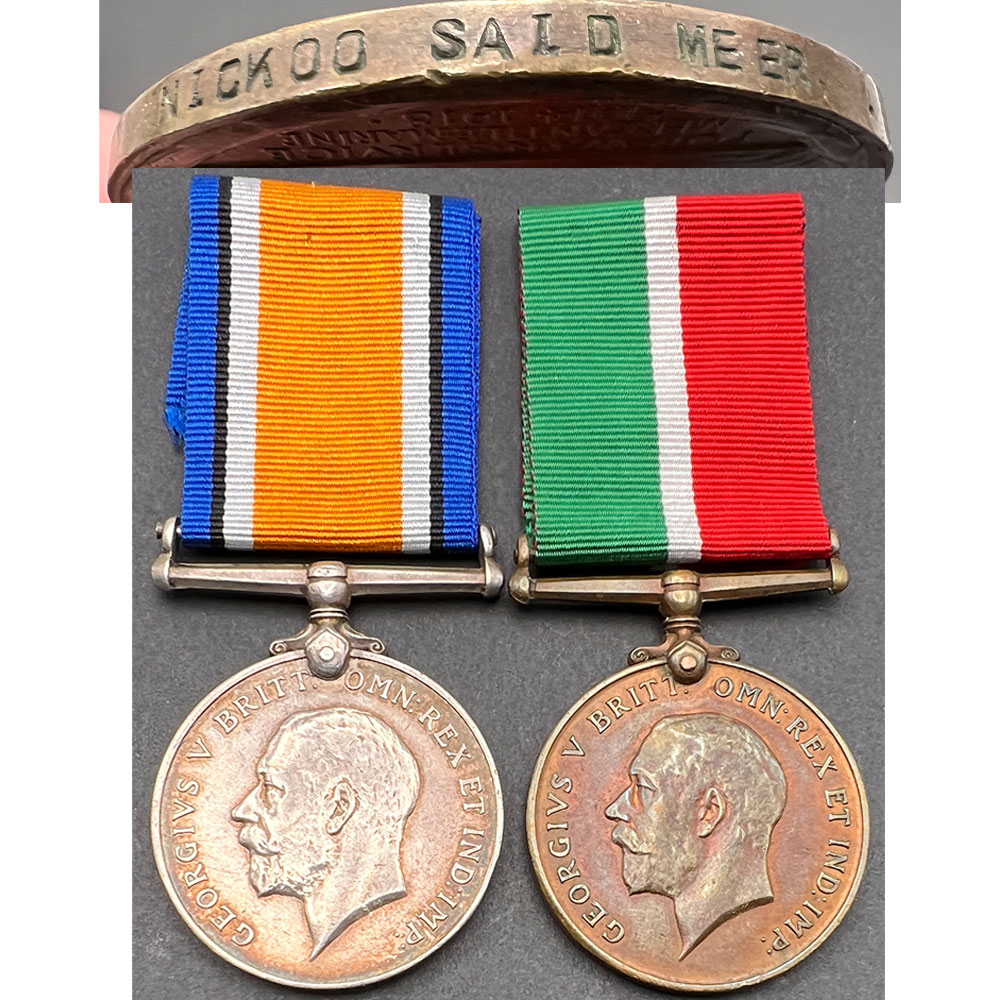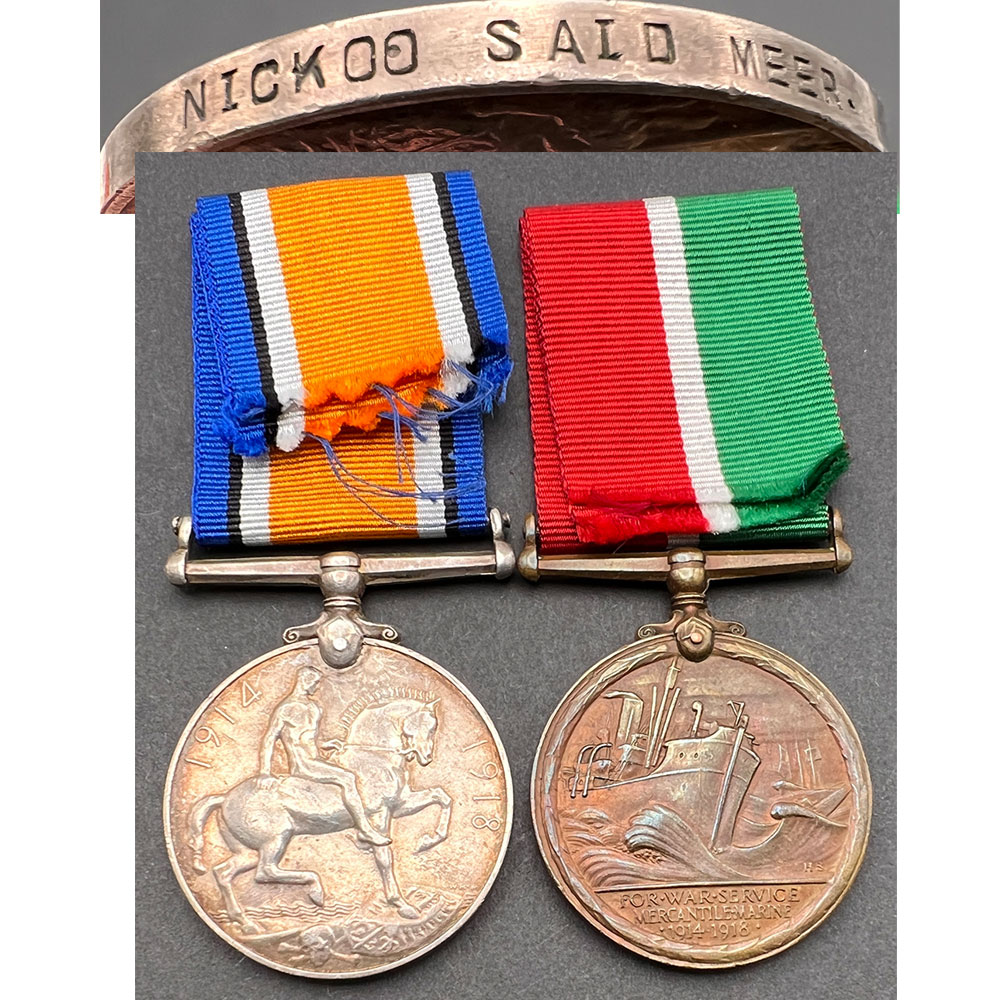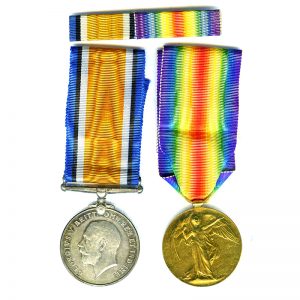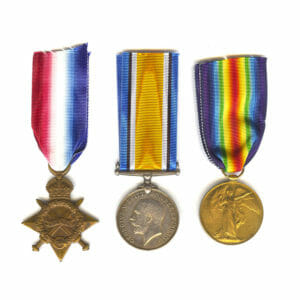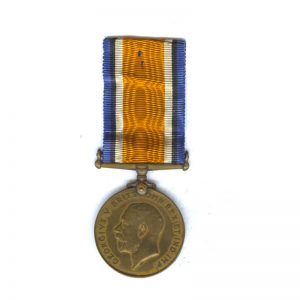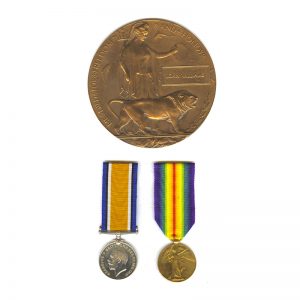Description
Mercantile Marine War Medal, British War Medal Pair, Nickoo Said Meer, a Muslim Indian from Punjab. An unusual issue.
Officially impressed: “Nickoo Said Meer”.
Unusual to find to Indian Crew with low survival rates, Provenance, ex DNW 19th Sept 2013, “Awards to the Indian Army from the Collection of AM Shaw”
Nickoo Said Meer was born circa 1889 in Punjab (Punjaub), India, on the border of Pakistan.
Leading up to the war Nickoo Said Meer worked in the Merchant Navy, and can be found on the crew lists of the P&O Line between 1909 and 1916, where he saw a number of journeys to Australia and back.
The ships he served on employed a large number of Indian Crew who worked as Firemen, Cole Tenderers, they worked in the Engine Rooms mostly keeping the ship running.
In 1909, he sailed on the S.S. Marmora from London to New South Wales, as a young 20 year old Coal Tenderer, on 8th April 1909.
During World War 1 he can be spotted on at least 3 Journeys to Sydney, New South Wales;
On 6th March 1915, he travelled to Sydney on the SS Mongolia.
ON 25th June 1915, he travelled to Sydney on the SS Mongolia
On 7th August 1916 he travelled to Sydney, now on the SS Mooltan.
These Defensively Armed Merchant Ships helped many times to ship Australian Troops to fight in World War 1, The Australian War Memorial contains many recollections and photographs of these journeys.
During his journeys he was employed as a Fireman and a Coal Trimmer/Tender, incredibly physically demanding jobs in the Engine Rooms of the ships.
Both Wartime ships he served on met ends at the bottom of the ocean.
The RMS Mongolia, launched in 1903, was mined on 24th June 1917, 50 nautical miles south by west of Bombay, inward from London with Passengers and Mail, the mine was laud by the German Ship SMS Wolf, fortunately many survivors made it by lifeboat to a nearby island from which they were rescues.
Similarly, within a month, the HMAT RMS Mooltan was torpedoes and sunk by UC27 on the 26th July 1917.
https://www.pandosnco.co.uk/mooltan_1905.html PANDOSNCO.co.uk’s page on the ship recalls the following:
On 25th July 1917, she left Malta en route for Marseilles with the Messageries Maritimes steamer Lotus and two escorting Japanese destroyers, Kusonoki and Ume.
The following evening she was torpedoed, forward on the starboard side at 1915hrs by the German submarine UC27, endangering Lotus (which had in fact been UC27’s first target).
All but two of the 554 aboard had been taken off by 2015hrs, when Mooltan was abandoned, about 100 miles south of Sardinia, to be sunk two hours later by a second torpedo.
On 28th July 1917, her passengers and crew were landed at Marseilles “Mooltan, a steamer of 9,621 grt was torpedoed and sunk on July 26, 1917 by the German submarine UC 27 53 miles NNW1/2W Cape Serrat 37°56’N, 08°34’E while on a voyage from Sydney, NSW and Freemantle for London with general cargo, mails, and meat. Two lives lost. The Mooltan was being escorted at the time by two Japanese destroyers, the Kusonoki and the Ume, and all but two of those on board the ship were rescued by these escorting ships. The Kusonoki & Ume then engaged the German submarine, but were unsuccessful in their attempts to sink her, and had to disengage because they were leaving the second ship they were escorting (the Lotus) in a vulnerable position. Information was received privately on Monday that the P. and O. Company’s R.M.S. Mooltan, 9,505 tons, which left Melbourne for London on June 12, had been lost in the Mediterranean. The first official information of what had happened was received in a cable message from London: “Postmaster General reports mail leaving Adelaide on June 14 sunk by enemy action.” During the afternoon a statement was made available from the Navy Office, and great relief was experienced when it became known that the passengers had been saved.”
